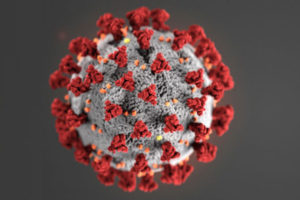COVID-19 in Ghana: Details on six confirmed cases
 Six people have tested positive for the Coronavirus (COVID-19) in the country as of March 14 after testing nearly 100 suspected cases, Dr Badu Sarkodie, Director of Public Health of the Ghana Health Service announced.
Six people have tested positive for the Coronavirus (COVID-19) in the country as of March 14 after testing nearly 100 suspected cases, Dr Badu Sarkodie, Director of Public Health of the Ghana Health Service announced.
Ghana confirmed its first two cases of the disease simultaneously on Thursday, March 12, which involved a Norwegian and a Ghanaian working in Turkey; while the four additional confirmed cases were reported on March 13 and 14 respectively.
Addressing the media in Accra on Sunday, to update the public on COVID-19, Dr Sarkodie said, all the six persons arrived at the Kotoka International Airport (KIA) without exhibiting any signs and symptoms of the disease and stayed in the country for some days.
He said all the six infected persons have been to countries with confirmed cases of the disease and are receiving treatment under isolated conditions.
The health authorities have begun contact tracing of the confirmed cases with 32 contacts identified for the first case whilst the second case (the Norwegian) had 107 contacts.
The third case was a student and also had identified 12 contacts whilst the fourth case (the man from Obuasi) had 30 contacts.
So far, all the six infected persons have had engagements with about 200 persons upon their arrival in the country.
Dr Sarkodie said the first person was a 36-year-old woman who returned from Turkey on February 29 and developed symptoms of the disease on March 10; the second case was a 60-year old Norwegian, who returned to Ghana on March 7 and started showing symptoms of the deadly virus on March 12, and when their samples were taken and tested at the Noguchi Memorial Institute for Medical Research, they proved positive.
The third person was a 26-year-old Ghanaian who returned from a trip in the United Kingdom on March 4 and developed symptoms of the disease on March 12, and reported to a health facility in Obuasi in the Ashanti Region and when a sample was taken for testing at the Kumasi Centre for Collaborative Research it proved positive.
The fourth case was a female student who returned from the United States of America on March 9 and started developing symptoms on March 13 and after a sample was taken and tested at the Noguchi Memorial Institute and it proved positive.
The fifth person was a 42-year-old man who returned to Ghana on March 8 after travelling to Switzerland and started showing symptoms on March 9; the sixth person was a 41-year-old Ghanaian who reported to the Tema General Hospital on March 14 after travelling to Germany and Turkey within the last 14 days and samples taken for testing proved positive.
Dr Sarkodie advised the public to adhere to the precautionary and preventive measures issued by the health authorities including the frequent washing of hands with soap under running water, the usage of alcohol-based sanitizers on hands, avoiding handshakes, covering one’s mouth with tissue when sneezing or coughing and keeping a distance of two metres from persons with fever, cough and sneezing.
He said it is advisable to eat healthy, avoid stress, sleep enough and stay home when you feel unwell as well as restricting travels to countries with confirmed cases of the virus.
The Ghana government has set aside $100 million for preparedness and response plans.
Ghana has so far tested about 100 suspected cases of coronavirus at the Noguchi Memorial Institute for Medical Research and Kumasi Centre for Collaborative Research.
The disease, since it was reported inDecember last year in the Hubei Province of Wuhan in China, the disease has spread to more than 120 countries and territories with 153,586 reported cases and about 5,789 deaths globally.
Symptoms of coronavirus include; fever, cough, and difficulty in breathing which could be fatal.
The disease is spread through coughing, sneezing and touching or contact with infected person.
Presently, various treatment options are being explored; there is no cure, treatment is mainly symptomatic; there is no vaccine and prevention is mainly by adherence to cough and sneezing etiquettes and improved personal hygiene.
Source: GNA
